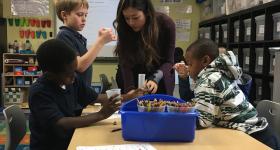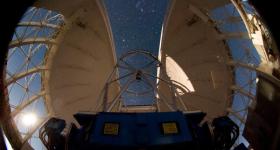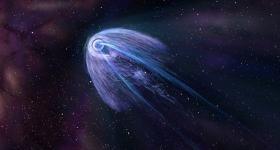Scholarship Program to Boost STEM Teachers
Thanks to a new grant, GW students majoring in physics and other STEM fields can apply to receive two years of tuition in exchange for teaching after graduation in a high-need school district.


In the Physics Department, students gain hands-on research experience with department faculty, innovative equipment and scientists from some of the world's top institutions. For more than a century, the department has spearheaded important discoveries in our labs and fostered generations of researchers, systems engineers, environmental scientists and biomedical engineers. Outside the department, our faculty hold leadership roles with partner institutes around the world, offering students unparalleled research and employment opportunities.
With lab groups across many interest areas, undergraduate and graduate students can build their research experience and present, publish and win awards for their work. Research is ongoing in experimental and theoretical nuclear physics, experimental and theoretical biophysics, and high-energy astrophysics.
“[The university] combines the academic environment and also the research environment because GW is located in a hub of educational institutions and research centers. … The people that exist at and near the university are such fantastic scientists and personalities.”
Chryssa Kouveliotou
Professor of Astrophysics


The Physics Department operates out of historic Corcoran Hall and the state-of-the-art Science and Engineering Hall (SEH). Labs are outfitted with cutting-edge equipment. The department also partners with researchers from other sciences at SEH, and faculty collaborate with many of the country's top research institutions located in the Washington, D.C., area.
Completed in the basement of Corcoran Hall in September 2024, the cluster is envisioned as infrastructure to support the teaching and research mission of the Physics Department.


Scholarship Program to Boost STEM Teachers
Thanks to a new grant, GW students majoring in physics and other STEM fields can apply to receive two years of tuition in exchange for teaching after graduation in a high-need school district.

GW Researchers Help Build Advanced Astronomical Instrument
OCTOCAM will allow astronomers to study the visible and near-infrared light from astronomical objects in more detail than ever before possible. The completed instrument will be used at the Gemini...
Frederick Battista, BA ’10 asks, “Did you know that software engineering is less fun than studying the fundamental nature of the universe? You did? How sad! And yet, it is...

Not all pulsars rocketing through space are alike. Using NASA images, PhD candidate Noel Klingler and a team of other researchers are discovering why some stars shine with different lights.
